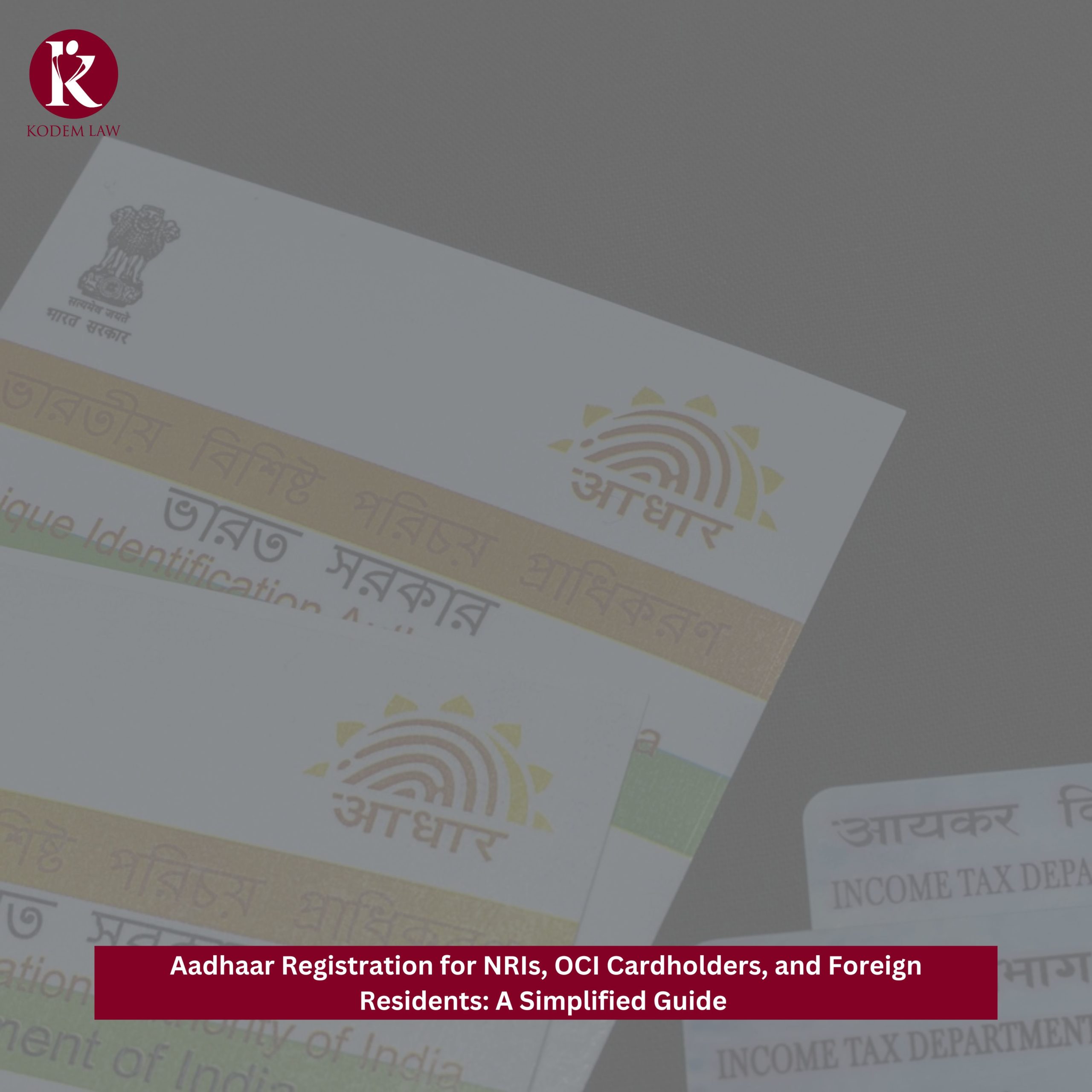
Aadhaar registration offers numerous benefits for NRIs (Non-Resident Indians), OCI (Overseas Citizen of India) cardholders, LTV (Long-Term Visa) holders, and foreign nationals residing in India. While Aadhaar is optional for foreign residents, it can simplify key processes like government job applications, tax filing, and availing various subsidies. However, understanding the requirements and the application process is essential for a smooth experience. In some cases, seeking legal assistance may streamline the process and help ensure all conditions are met.
Here’s a complete guide to understanding eligibility, requirements, and how to streamline the process with professional assistance.
Eligibility for Aadhaar Registration
Aadhaar registration is available to NRIs, OCI cardholders, LTV holders, and foreign nationals who meet certain criteria. Here’s an overview of the eligibility requirements:
1. Residents of India: Aadhaar is available to all residents of India, regardless of nationality.
2. OCI Cardholders: Must have lived in India for at least 182 days during the 12 months preceding the application date. A valid Indian address is required.
3. NRIs (Non-Resident Indians)
- NRIs are eligible only if they have stayed in India for a minimum of 182 days in the last 12 months.
- A valid Indian passport is mandatory for enrolment.
- NRIs can apply at any Aadhaar Kendra with their passport as proof of identity (PoI).
- If the passport includes the spouse’s name, it can also serve as proof of address (PoA) for the spouse.
- If the NRI’s passport address is outdated, they may provide an updated Indian address with supporting PoA documents.
- NRIs cannot register international or non-Indian mobile numbers for Aadhaar.
4. LTV (Long-Term Visa) Holders: Eligible if belonging to minority communities from Pakistan, Afghanistan, or Bangladesh (Hindus, Sikhs, Buddhists, Jains, Parsis, Christians), and meeting the stay requirement.
5. Nepal & Bhutan Nationals: Eligible with a valid passport or other relevant documents.
6. Resident Foreigners: Must have lived in India for at least 182 days in the last 12 months.A valid Registration Certificate or Residential Permit from FRRO/FRO is required, except for OCI cardholders, LTV holders, or nationals of Nepal or Bhutan.
Importance of Aadhaar for Specific Situations
Aadhaar plays a crucial role in several scenarios, even though it is optional in many cases. Below are some instances where Aadhaar can be highly beneficial:
- Availing Subsidies for NRIs Returning to India: Aadhaar enables access to government subsidies and welfare programs, simplifying the process for NRIs transitioning back to life in India.
- Establishing Proof of Identity During Long-Term Stays in India: Aadhaar serves as a reliable identification document, simplifying the bureaucratic procedures.
- Simplifying Utility Service Applications: Applications for essential services such as electricity, water, and internet become more seamless with Aadhaar as proof of identity and address.
Digital Aadhaar Services and Updates
Digital Aadhaar services include e-Aadhaar, the mAadhaar app, and online update facilities. These services allow residents to access and update their Aadhaar information online. make it convenient for residents to access and update their Aadhaar information from anywhere.
e-Aadhaar
- Allows residents to print their Aadhaar letters from the UIDAI resident portal
- Requires the 28-digit enrollment ID, name, and pin code to access
- Uses security features like captcha and One-Time-Pin (OTP) on mobile
mAadhaar app
- Allows residents to download their e-Aadhaar
- Allows residents to share their eKYC or QR code with service providers
- Requires users to create a 4-digit PIN or password
Online updates
- Allows residents to update their address and documents online
- Requires users to have a mobile number registered with Aadhaar
- Requires users to upload supporting documents
Update at an Aadhaar Enrolment Centre
- Allows residents to update their demographic or biometric information
- Requires an operator to collect documentary evidence
Aadhaar Deactivation or Re-Activation for NRIs and Foreigners
Aadhaar registration can be highly beneficial for NRIs (Non-Resident Indians), OCI (Overseas Citizen of India) cardholders, LTV (Long-Term Visa) holders, and foreign nationals residing in India. Although optional for foreign residents, having an Aadhaar card simplifies several essential processes, such as applying for government jobs, filing taxes, and availing of subsidies.
For those who need to deactivate or re-activate their Aadhaar, it is crucial to understand the eligibility requirements, procedures, and necessary documentation. Additionally, seeking professional guidance can help avoid delays and ensure compliance with all regulations.
Key Scenarios for Aadhaar Deactivation or Re-Activation:
1. Deactivation: If a resident no longer meets the eligibility criteria (e.g., no longer residing in India for 182 days annually), their Aadhaar may require deactivation to avoid misuse or penalties.
2. Re-Activation: For NRIs or foreign nationals who return to India and meet the eligibility criteria again, re-activation of Aadhaar ensures uninterrupted access to its benefits.
Aadhaar Registration for Children of NRIs
1. Children Below 5 Years
- A parent or guardian must consent and sign the enrolment form.
- If the child is an NRI, a valid Indian passport is required as proof of identity (PoI). Indian resident children can use a birth certificate or other valid relationship document for enrolment.
2. Children Aged 5-18 Years
- A parent or guardian must provide consent for enrolment.
- For NRIs, a valid Indian passport is required as PoI. Indian resident children can use documents like a birth certificate or school ID card for enrolment under the Head of Family (HoF) mode.

Key Requirements and Benefits of Aadhaar
Aadhaar is optional for NRIs and foreign residents, but it can greatly simplify various processes in India, such as banking, tax filing, and employment. Here are some key points to keep in mind:
1. Validity
- Aadhaar issued to resident foreigners is valid only for the duration of their visa.
- Nepalese and Bhutanese nationals receive Aadhaar with a validity of up to 10 years.
- Aadhaar for OCI cardholders is valid for 10 years.
- For LTV document holders, Aadhaar remains valid until the expiry of the LTV document.
2. Usage and Alternatives
- NRIs are not required to link Aadhaar to their bank accounts unless seeking benefits under Section 7 of the Aadhaar Act.
- If the physical Aadhaar card is unavailable, e-Aadhaar, Aadhaar letters, or the mAadhaar app can be used as valid identification.
3. Key Benefits
- Aadhaar simplifies the KYC process for banking, property transactions, and other activities.
- It is widely accepted as a reliable proof of identity throughout India.
- It is especially beneficial for NRIs seeking government employment.
- Aadhaar is required for filing Income Tax Returns (ITR) under Section 139AA, making tax filing more convenient.
How Kodem Law Can Help you?
Aadhaar registration offers valuable benefits for NRIs, OCI cardholders, LTV holders, and foreign nationals. It simplifies essential processes like banking, tax filing, and accessing government services.
At Kodem Law, we guide you through every step of Aadhaar registration, ensuring eligibility requirements are met and documentation is complete. Our expertise helps avoid delays and makes the process smooth and hassle-free.
📞 Contact Kodem Law today to streamline your Aadhaar registration and enjoy a hassle-free experience!

